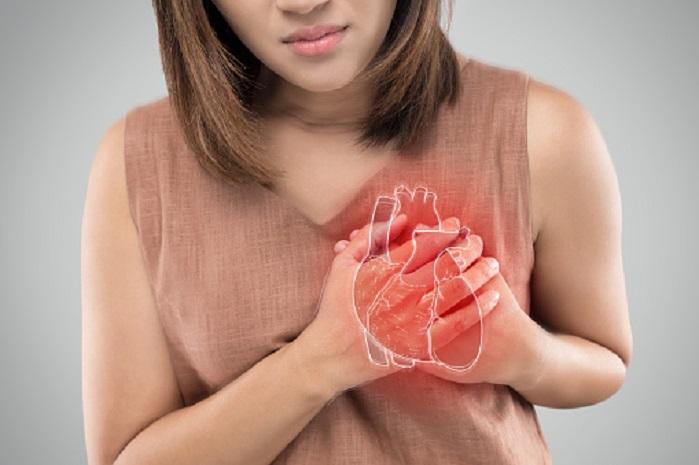9 most common heartbreak symptoms (physical & mental)

When you think of a broken heart, you probably think of a cartoon drawing of a heart with a jagged line through it, but a real broken heart can even lead to physical consequences.
For example, there are certain links between mental health, depression, and heart disease. Read here about how an extremely stressful event, such as heartbreak, can have a significant impact, both physically and mentally.
Literally a broken heart in heartbreak: is that possible?
The answer to this question is: yes, you can! The broken-heart syndrome, also known as stress-induced cardiomyopathy or Takotsubo cardiomyopathy, can strike even if you are very healthy.
Women are generally more likely than men to experience sudden, intense chest pain in response to a surge of stress hormones that an emotionally stressful event can trigger.
Heartbreak is, of course, not necessarily accompanied by a breakup. You can experience heartbreak in different ways. For example, you can experience heartbreak after the death of a loved one or even after a divorce, breakup or physical separation, or romantic rejection or betrayal by someone you love. It can also happen after a breakup with a close friend, losing a pet or a child, finding out that you are infertile, et cetera. It can even happen after a good shock (like winning the big cash prize, for example).
Sometimes broken heart syndrome is misdiagnosed as a heart attack because the test results and symptoms of both are similar. Tests even show dramatic changes in heart rhythm and blood substance, which are also hallmarks of a heart attack.
However, unlike a heart attack, there is no evidence of arteries being blocked in the heart in broken heart syndrome.
In broken heart syndrome, part of your heart temporarily enlarges and does not pump blood properly, while the rest of your heart functions normally or with even more force.
The bad news is that in some cases, broken heart syndrome is more than something that only affects you for a limited time. It can potentially lead to severe, short-term heart muscle failure. Heartbreak can give you a broken heart, and this can be dangerous.
The good news is that broken heart syndrome is treatable in most cases. Most men and women who have had it make a full recovery within a few weeks and have a shallow risk of it happening again. In rare cases, it has proved fatal.
9 most common heartbreak symptoms (physical & mental)
There’s a reason you feel exhausted and nauseous after a breakup: a broken heart takes a physical toll on your body.
If you feel withdrawn from the world when you go to bed, you are not alone. A broken heart can make you feel like you don’t know it all for a while. Crying is standard, as are feelings of melancholy (melancholy/sad view of the past), but physical symptoms also exist.
Below we will describe both the physical and mental symptoms of heartbreak.
1. Bad night’s sleep
At least in the early stages, dealing with heartbreak often causes significant damage to your sleep schedule. Sleep disorders such as insomnia are common in the recent bachelor.
The stress of a breakup can keep you tense and disrupt the biological processes that generally help you fall asleep at the end of the day. It is also possible that you sleep way too much and lie in your bed all day. This is, of course, not good either. A bad night’s sleep is one of the most common symptoms of heartbreak.
2. Fear
Anxiety and palpitations often go hand in hand with a broken heart. It is essential to know that the grief of a broken heart can overwhelm the nervous system. It is pretty standard that the state of hypo arousal feelings of loss of control caused.
3. Broken Heart Syndrome
As mentioned earlier, a breakup can lead to symptoms similar to a heart attack in some extreme cases. Broken heart syndrome — or Takotsubo cardiomyopathy, first described in Japanese medical literature in the 1990s — is a temporary heart condition that looks and feels like a heart attack and is often triggered by stressful situations and the death of a loved one a breakup.
The broken-heart syndrome is diagnosed in about 1 to 2 percent of patients with symptoms of a heart attack in the hospital.
The symptoms, changes in the electrocardiogram, and blood tests of people with broken heart syndrome are similar to those of typical heart attack patients, even though the heart’s arteries remain open. (In a typical heart attack, the arteries are blocked.)
Patients with broken heart syndrome also have extensive abnormalities of heart muscle function during the event. The heart muscle malfunction fully recovers over the next few months in people who survive it. Unfortunately, patients with broken heart syndrome continue to have an increased risk of heart disease and stroke.
At least 6,000 cases of broken heart syndrome occur in the United States each year, and up to 90 percent of patients are women, primarily postmenopausal. If you are a woman, you are more likely to have broken heart syndrome than a man.
4. Lose or gain weight; appetite changes
If you suffer from heartbreak, you may have no appetite at all. All you think about is what you experience heartbreak. You try to eat, but generally, you don’t get a bite. Logically, you will lose some pounds. You usually gain this back after your heartbreak is over.
It is also possible that you start eating more and more because of your heartbreak. In that case, the food offers you comfort, and you feel better if you have eaten something tasty. In that case, you will probably gain some pounds. A change in appetite is one of the most common symptoms of heartbreak.
5. Fatigue and lack of energy
If you are heartbroken, you may constantly feel fatigued and have no energy at all to do things. You don’t want to go to work; you don’t want to work on your studies; you don’t feel like shopping or exercising; in short, you don’t want anything at all.
This is, of course, not crazy. Your mind revolves around that heartbreak all day, and that can be pretty exhausting. In addition, you naturally have a lot of sadness, which also makes your energy level plummet. That is why fatigue and lack of energy are some of the most common symptoms of heartbreak.
6. Difficulty concentrating and making decisions
If you suffer from heartbreak, you probably also notice that you have trouble concentrating. Your mind isn’t there, and you’re busy with other things. You are still trying to process your grief, but you have to move on with your life in the meantime.
That’s what people with heartbreak often have a problem with, and it’s one of the most common symptoms of heartbreak.
7. Loss of fun and interest
Another symptom of heartbreak is that many of the things you used to enjoy don’t get any pleasure at all. You don’t care that much anymore. You also don’t feel like doing things that could give you pleasure, and you are punishing yourself with that.
8. Sadness and an empty feeling
Sadness is a normal reaction after a stressful life event. Research has shown that breakups can affect people in some profound ways.
After a relationship ends, people report experiences such as anxiety, loneliness, and even loss of self-esteem.
So give yourself time to mourn the loss of a relationship or, for example, a loved one. Healthy responses include periods of crying, sadness, regret, and frustration. It’s a period of adjustment, so you need to give yourself some time to deal with it and heal before you can move on.
Although upset now, these feelings usually begin to subside over time as you recover from the breakup and your heartbreak.
9. Situational depression
As a form of situational depression, the end of a relationship is what causes these feelings. A (relationship) breakup can be a point of significant change in someone’s life. Not only does it mean you are no longer involved with someone you once loved dearly, but it can also lead to a whole host of life changes.
For example, consider moving house and shared friends taking sides, which in turn can lead to the end of other meaningful relationships. You may need to discuss and address your finances and even the challenges of co-parenting with your ex.
Breaking up with someone can also affect how you see yourself.




